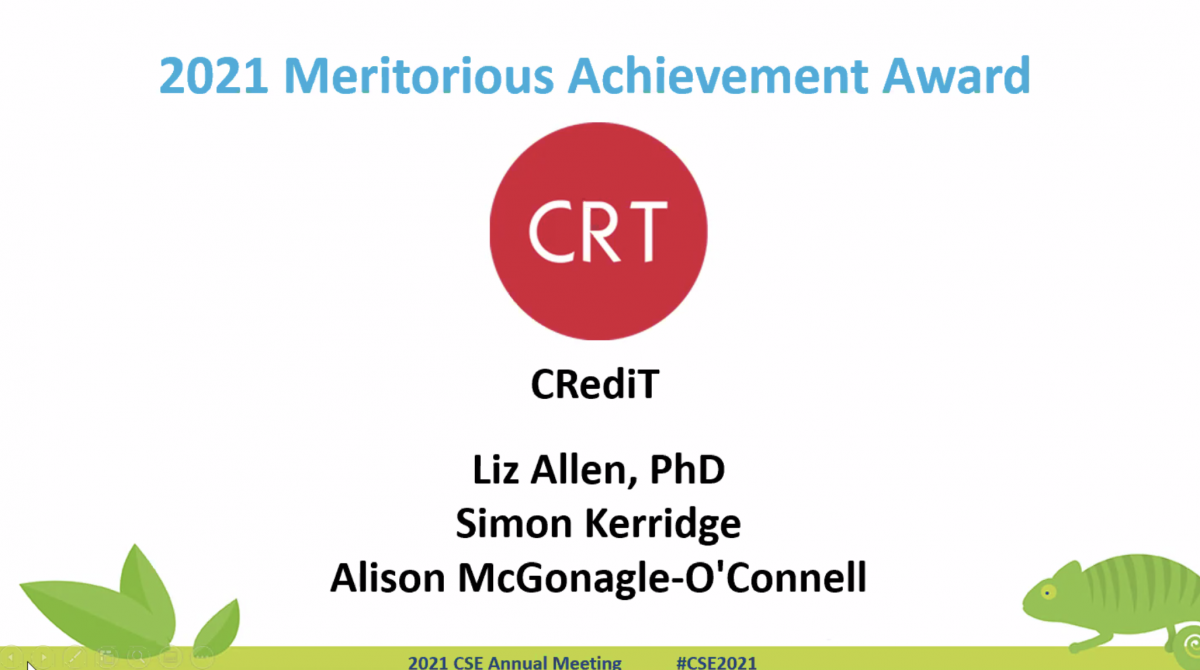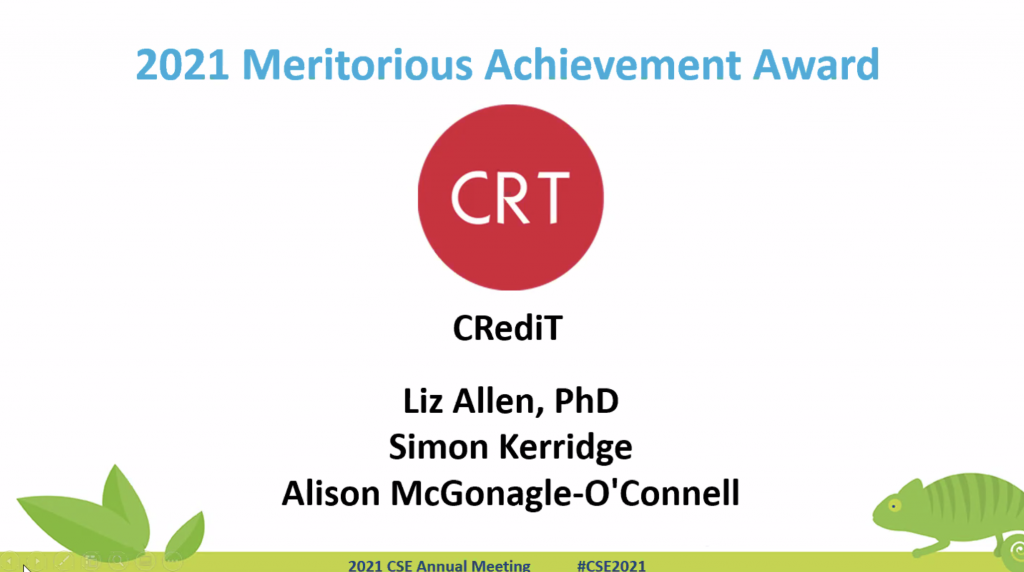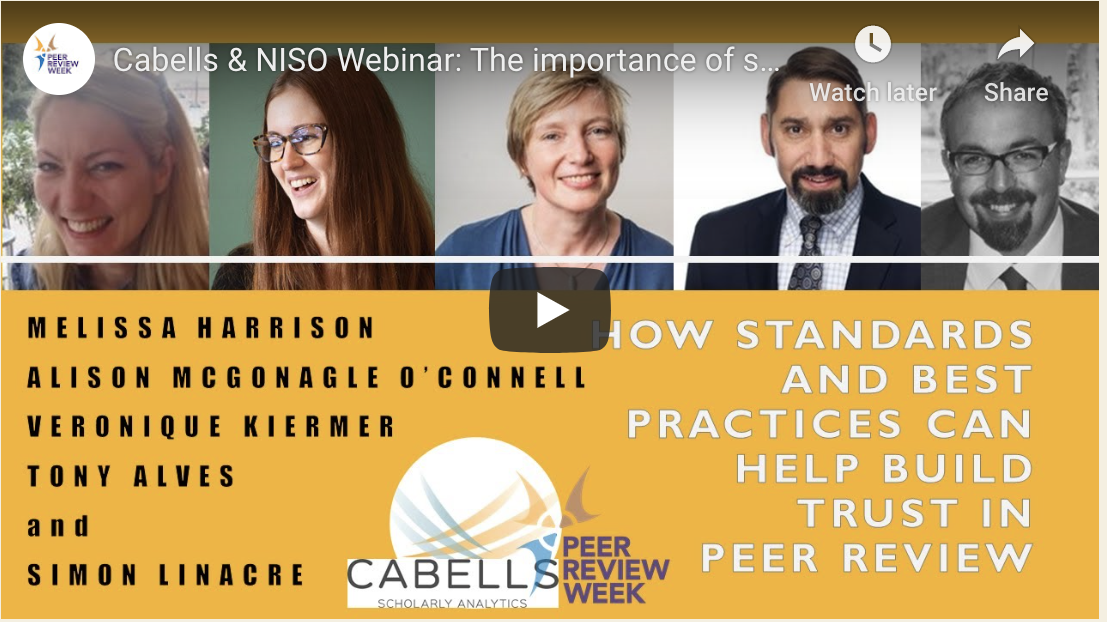As part of our CRediT Peer Review Week contributions, NISO Associate Executive Director Nettie Lagace interviewed CRediT Co-Chair Simon Kerridge on Identity in Peer Review. Please watch and enjoy their discussion, and stay tuned as we will release a discussion of this topic by key metascience scholars later this week.
It is Peer Review Week 2021, and this year’s theme is Identity in Peer Review. We are excited to participate by sharing some videos across the week. Stay tuned to hear contribution community thought leaders sharing their insights on this interesting subject.
Here is a peek at what’s ahead later this week. Keep checking back, and also check in with the PRW website and YouTube channel to keep up with all of the ideas and perspectives around Identity in Peer Review.

In 2021, CRediT achieved a number of important milestones, including:

- CRediT awarded the Council for Science Editors’ Meritorious Award – we are honored to be recognized with the CSE’s Meritorious Achievement Award for 2021. The presentation took place at this year’s Annual Meeting, and past awardees include some important initiatives and distinguished company.
2. CRediT + ORCID: Together, at last!
CRediT is now officially supported in the ORCID API 3.0, with the ‘launch’ of the Contributor Roles Taxonomy alongside existing contributor roles.
With the addition of these 14 contributor roles, research contributors—who may play multiple roles in a single published work—can now have all facets of their work recognized. ORCID members can now add this data, enabling the information to be filtered to other systems that read ORCID data via the API or the public data file, thus creating greater transparency and recognition.
CRediT roles will be visible in the UI in the same way existing roles are, based on the user’s visibility preferences. As part of our ongoing work, we are continuing to look at ways we can allow users to include co-author and contributor data when adding research outputs to their ORCID record manually.
The ORCID API 3.0 now supports our existing list of contributor roles and CRediT roles, meaning that members can start using CRediT without having to upgrade to a newer API version. However, you will need to update your existing integration to begin leveraging CRediT.
3. Publishers can use Rescognito to manage CRediT outside of traditional publishing workflow
Rescognito allows researchers to claim CRediT using the DOI for their manuscript (just add the DOI to the end of the Rescognito URL. e.g., https://rescognito.com/10.5281/zenodo.3899865… ). Following ORCID’s announcement of the addition of CRediT to records, Rescognito will implement functionality to push these CRediT recognitions to ORCID with the user’s permission. This is an option in addition to existing integrations with several Manuscript Submission and Peer Review systems, allowing for the management of CRediT upstream in publishing workflow. Stay tuned for more details as they develop!
4. More new adopters!
ASHA: American Speech-Language Hearing Association recently announced their adoption of CRediT in a community blog post, which also spotlighted other Literatum journals and publishers who are capturing and displaying contributor roles.
CRediT secures grant funding
Funds awarded to support a two-year outreach & engagement campaign
The CRediT Steering Committee are delighted to announce that the CRediT project has been awarded generous grant funding from the Alfred P. Sloan Foundation and Wellcome. The funds are committed over a two-year period and will be used to continue to support implementations of the taxonomy across scholarly publishers, and within the scholarly research ecosystem more broadly.
These funds are invaluable as CRediT formalizes its affiliation with the National Information Standards Organisation (NISO[1]) and works to develop a coordinated programme of outreach and engagement. In the coming year, work will focus on building out the resource and materials to support adoption and implementation of CRediT, particularly through the new website hosted by NISO, and working with NISO to set up and direct a CRediT Interest Group (CIG) to support regular engagement, capture feedback, and consider future developments of the standard to keep it useful, current and to ensure that it supports the full spectrum of research disciplines.
Simon Kerridge, Director of Research Policy and Support at the University of Kent, and CRediT co-Chair commented, “We are so pleased that funding agencies like the Sloan Foundation and Wellcome view projects like CRedIT as important pieces of the research infrastructure that need support. Interest in CRediT continues to increase, and to be awarded funds at this time makes a real difference to the speed with which we can help CRediT to grow and be used to best effect.”
Josh Greenberg, Director of Digital Technology Program at the Sloan Foundation said, “The Alfred P. Sloan Foundation is pleased to help support the CRediT project’s movement into this phase of broader implementation and adoption. The Foundation’s Scholarly Communication program was founded on the premise that a broader array of signals was necessary to improve the discovery and review of diverse scholarly materials, and more granular precision about the various roles in the research enterprise is essential both to create incentives and reward structures for different contributions as well as to improve assessments of where to direct attention and trust.”
Dr Georgina Humphreys of the Open Research Programme at Wellcome notes,“We are pleased to support CRediT as a system to enable recognition for all members of research teams and an infrastructure to enable a shift in research culture and open practices.”
ABOUT THE ALFRED P. SLOAN FOUNDATION
The Alfred P. Sloan Foundation is a not-for-profit, mission-driven grantmaking institution dedicated to improving the welfare of all through the advancement of scientific knowledge. Established in 1934 by Alfred Pritchard Sloan Jr., then-President and Chief Executive Officer of the General Motors Corporation, the Foundation makes grants in four broad areas: direct support of research in science, technology, engineering, mathematics, and economics; initiatives to increase the quality and diversity of scientific institutions and the science workforce; projects to develop or leverage technology to empower research; and efforts to enhance and deepen public engagement with science and scientists. sloan.org | @SloanFoundation
ABOUT WELLCOME
Wellcome exists to improve health for everyone by helping great ideas to thrive. Wellcome is a global charitable foundation, both politically and financially independent. Wellcome supports scientists and researchers, take on big problems, fuel imaginations and spark debate. For more about Wellcome’s open research initiatives see https://wellcome.org/what-we-do/our-work/open-research and contact: openresearch@wellcome.org
[1] http://159.203.176.220/

In celebration of Peer Review Week 2020, NISO and Cabells collaborated to host a webinar highlighting the importance of standards toward improving trust in peer review.
CRediT co-chairs were delighted to be invited to share ideas about how CRediT can fit in to the peer review landscape, both today and in future.
Watch this video recording to hear from Alison McGonagle-O’Connell on CRediT, as well as co-presenters Veronique Kiermer, PLOS, Tony Alves, Aries Systems, Melissa Harrison, eLife and moderator Simon Linacre of Cabells.
American Association for Cancer Research (AACR) adopted CRediT across nine journals, replacing a custom contributor roles taxonomy previously in use.
AACR’s implementation is unique, in that they require the corresponding author to indicate each author’s contributions at first revision and each revision thereafter, and the system communicates these selections to each co-author in an individualized email alerting them to the completed submission. Each co-author is encouraged to contact the corresponding author regarding any requested changes to their declared contribution. This is possible through support from their submission and peer review system, eJournalPress.
“Before implementing CRediT, we solicited contributions from each co-author using electronic forms,” commented Daniel Evanko, Director of Journal Operations and Systems at AACR, “and we found that corresponding authors were sometimes surprised when they saw the article proof and the contributions claimed by a co-author. This could cause delays as we worked with authors to sort out contributions. The new workflow streamlines the process and increases transparency for all contributors, and accuracy for the scholarly record. While the implementation was very recent, we are generally very pleased with the adoption and implementation.”
“One of the most exciting things about the CRediT community is observing the diversity of approaches to implementation and integration, including workflow,” commented Alison McGonagle-O’Connell, NISO CRediT Working Group co-chair. “I’m looking forward to a future case study or author survey assessing preferences from this group who may have been exposed to both role solicitation workflows. I’m also thrilled AACR has joined the growing community of adopters!”
The integration is live for Blood Cancer Discovery, Cancer Discovery, Epidemiology, Biomarkers & Prevention, Cancer Immunology Research, Cancer Prevention Research, Cancer Research, Clinical Cancer Research, Molecular Cancer Research, and Molecular Cancer Therapeutics.
CRediT to partner with NISO
Baltimore, MD – July 23, 2020 – Following their April 2020 announcement, the National Information Standards Organization (NISO) and the Contributor Roles Taxonomy (CRediT) Steering Committee have now achieved two more important milestones in their work to formalize and develop CRediT both as a NISO/ANSI standard and as a community.
NISO and the CRediT Steering Committee have set up an initial working group to complete editorial changes to the taxonomy language and submit for NISO/ANSI standard approval in September. In addition, they have launched this new website to provide information, resources and news to update the expanding community of interest. A CRediT Twitter account has also been created — @contributor_roles.
“With NISO’s strong support and adept project management, our team has been able to accelerate the pace of our work to share CRediT with the community – to make it as usable and useful as possible,” commented Liz Allen, Director of Strategic Initiatives at F1000, one of the Taxonomy’s originators, and current Steering Committee member. “We look forward to full standardization, wider adoption, and continued interest, feedback, and support from both NISO and the broader community of integrators and adopters.”
“It is a pleasure to support CRediT,” commented Todd Carpenter, Executive Director of NISO. “There is real, palpable momentum centered around the taxonomy, and we are thrilled to be helping secure its foundation and support its scale-up, as transparency into contributions has many benefits for the scholarly information ecosystem.”
Visit the new website to learn more about this collaboration. Please note that any links in current adopter and integrator instructions for authors, and other reference documentation, should be updated so that they point to the taxonomy’s new home.
About CRediT
CRediT (Contributor Roles Taxonomy) is a high-level taxonomy, including 14 roles, that can be used to represent the roles typically played by contributors to scientific scholarly output. The roles describe each contributor’s specific contribution to the scholarly output.
About NISO
NISO, based in Baltimore, Maryland, aims to build knowledge, foster discussion, and advance authoritative standards development through collaboration among the cultural, scholarly, scientific, and professional communities. To fulfill this mission, NISO engages libraries, publishers, information aggregators, and other organizations that support learning, research, and scholarship through the creation, organization, management, and curation of knowledge. NISO works with intersecting communities of interest and across the entire lifecycle of information standards, and is a not-for-profit association accredited by the American National Standards Institute (ANSI). For more information, visit the NISO website (https://niso.org) or contact us at nisohq@niso.org.